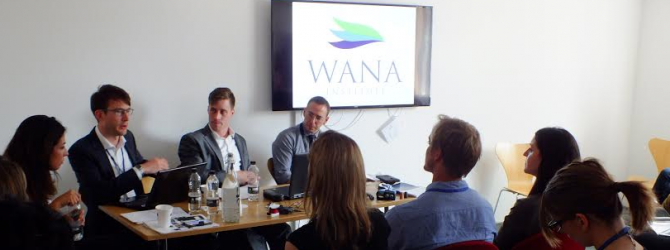-
WANA Research Fellow presents paper at Oxford ...
WANA Research Fellow presents paper at Oxford University's 2015 Humanitarian Innovation Conference

Last week, one of the WANA Institute’s research fellows, Sean Thomas, represented WANA at the Humanitarian Innovation Conference, hosted by Oxford Univeristy’s Centre for Refugee Studies. The Conference was held at Keble College, Oxford, in partnership with the World Humanitarian Summit.
The Humanitarian Innovation Conference occured in association with the Humanitarian Innovation Fund (HIF), a landmark grant-making fund to support organizations working in countries and regions facing humanitarian challenges, such as Haiti, Pakistan and East Africa, to develop, test and share new technologies, products and processes that will make humanitarian aid more effective and cost-efficient in the future. In keeping with the theme of HIF's work, the conference had the theme of ‘facilitating innovation', and focused on the role that techonology does, and can play in development, especially around issues concerning refugees and displaced persons.
WANA is thrilled to announce that Mr Thomas presented his paper, Disrupting the Institutional Environment of Refugee Assistance: Some Observations and Recommendations from Jordan, as part of his participation at the conference. This paper investigates and analyses some key trends of refugee policy programming at the governmental and humanitarian levels, taking examples from Jordan as one of the principal host states for Syrian refugees. It focuses upon major actors in the refugee policy arena, including the United Nations High Commissioner for Refugees, The World Food Programme and Jordan’s Ministry of Planning and International Cooperation. In addition to making a number of recommendations for practical changes concerning the provision of refugee assistance, the paper also reflects upon the normative dimension of the learned and repeated behaviours within and among these organisations vis-à-vis refugee response measures. Developing a theoretical framework from within the tradition of ‘new institutionalism’, and draws upon both its sociological and economic currents. Mr Thomas' paper begins to address the question: “How are accepted practices and prominent/dominant humanitarian actors and governmental institutions embedded in political, social and cultural fields of understanding in Jordan and the wider region? And to what extent does this constrain the potential for greater innovation in refugee assistance programmes?”
Images courtesy of the Humanitarian Innovation Conference 2015.
